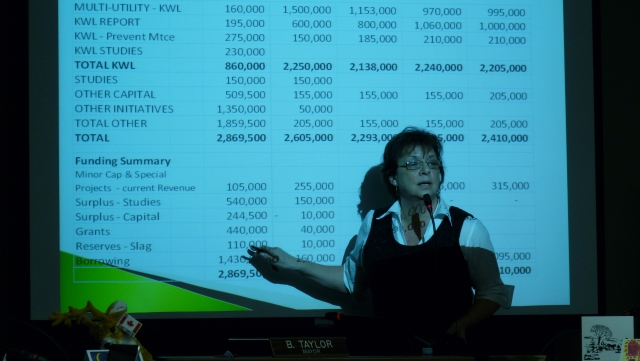User fee and tax increases expected for 2011 in Grand Forks
With a savings of $30,000 each year, Grand Forks City Council voted to stop accepting credit card payments starting in January 2011. This may be an inconvenience for some, but may help lessen the blow of increased taxes coming down the pipe. As part of council’s last public review of the proposed financial plan for 2011 and beyond at their meeting on Monday, Dec. 20, staff recommended eliminating credit card payments and re-directing the anticipated savings to pay for information systems upgrades. Overall council is facing is a daunting financial picture. Locals can anticipate increased taxes, electrical, sewer and water fees, and possible garbage rates as well over the next five years. “We have $1.4 million in surplus at the end of 2009, $270,000 in capital reserves and this (planned spending) is depleting it drastically in order to achieve the asset management that the city needs to start to head,” said Chief Financial Officer Cecile Arnott. “If you’re going to maintain the same levels of service that you’ve been maintaining, (rates have) got to increase. If operational costs go up, and you maintain services, then fees have got to go up.” The public will still be able to pay bills remotely through internet and telephone banking options, said Arnott, but will no longer be able to use credit once the bylaw passes the fourth and final reading at their next meeting. Much of the proposed budget increases are a result of the infrastructure upgrades recommended in the Kerr Wood Lidel report of 2009. This report said that the city will spend an anticipated $36 million in upgrades over the next few years. While the borrowing for the infrastructure repairs will not happen in 2011, there are a number of studies to complete prior to work starting and some small capital project that can be done. But that means spending $218,000 of the city’s current surplus and dipping into past surplus as well for a total of nearly $1.3 million. Councillor Chris Moslin supported the plan clearly stating the need for studies to proceed. “Council is being asked to fund studies this year, ahead of the referendum (on infrastructure borrowing), so that we will have facts for that referendum so we can develop a plan that will be worthy of taxpayers support,” said Moslin. “That’s the hard part. That for me is the crux of this plan – spending on studies prior to the actual referendum which may not succeed. That’s a risk that we have here.” The extra burden of taxation on the low income population of Grand Forks was questioned by Councillor Gene Robert. “I understand the infrastructure in this community is in a crisis state and council has to stand up and deal with it,” said Robert. “The other side of it is that when I go into the community and meet people who are spending all of their income to pay for rent, when I look at all the for sales signs in this community, and how tenuous industry is – these are issues that I see. I will probably vote against this five-year plan, not because of what it’s attempting to do in the future. But from the point of view of those who I think cannot afford it.”
Council passed the bylaw to accept the proposed financial plan for three readings.






















